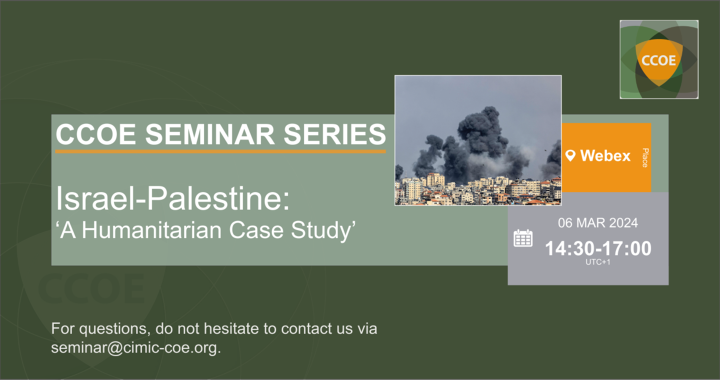Israel-Palestine: ‘A Humanitarian Case Study’ (06 MAR 2024)
The story of Israel and Palestine is a tale of two, bound by history and divided by ideology, where every step forward seems to be met with two steps back. The ongoing conflict between the Israeli military forces and Palestinian militant groups has exacerbated dire humanitarian conditions, leading to a pressing need for increased assistance to alleviate the suffering of civilians caught in the crossfire.
Our seminar has explored how effective collaboration between humanitarian organisations and military forces is essential for delivering aid and stabilising the region. Civil-Military Cooperation is critical in fostering collaboration between military forces and civilian entities in conflict zones, facilitating humanitarian efforts, promoting stability, and aiding in peacebuilding.
Through presentations by renowned experts with diverse perspectives, from functional and political to practical and academic, as well as a moderated Q&A session, we have deepened our understanding of the current situation in the Gaza Strip with a humanitarian focus. The seminar addressed the complexities of the conflict, the challenges faced by stakeholders, and potential paths towards peace and reconciliation, mentioning trust as a key mechanism.
The contributions of the experts to our seminar were invaluable in shedding light on the sensitivity and importance of the Israel-Gaza conflict, particularly in relation to the trust mechanisms necessary for initiating solution-oriented negotiation processes. Their expertise in this field inspired and empowered our audience to remain engaged and proactive in fostering awareness and understanding within the realm of Civil-Military Cooperation.
• Dr. Anthony Wanis-St. John – International Peace & Conflict Resolution Program, School of International Service, American University - Associate Professor
Dr. Anthony Wanis-St. John is an Associate Professor at American University’s School of International Service. He directed the M.A. in International Peace and Conflict Resolution from 2013 to 2016 and is the author of Back Channel Negotiation: Secrecy in Middle East Peacemaking (Syracuse University Press 2011). Furthermore, he co-authored “Negotiating Civil Resistance,” Peaceworks Vol. 129 (2017). With Roger Mac Ginty he co-edited the 3rd edition of Contemporary Peacemaking (Palgrave Macmillan 2022).
His research, practice and teaching focus on negotiations in conflict zones, including peace processes, ceasefires and civil society engagement. His practical experience includes Europe, South West Asia, the Middle East, Africa, the Caribbean and Latin America. He works closely with the Department of Defense’s Defense Security Cooperation University on its training for civilian and military advisors, including the U.S. Army’s Security Force Assistance Command. He has successful experience in mediating disputes within federal agencies and corporations and mediating labour contracts and disputes within the education sector in the US. Dr. Wanis-St. John has also consulted with the World Bank and USAID on rule of law programmes in countries such as Bolivia, Guatemala, Mexico, Venezuela and El Salvador. He has provided negotiation training and lectures to the U.S. Joint Special Operations University, U.S. Army 352nd Civil Affairs Command and the 450th Civil Affairs Battalion as well as Marine Corps University’s Command and Staff College, the Department of Labor’s International Labor Affairs Bureau, the Department of State’s Conflict and Stabilization Operations Bureau, the World Bank, Center for Strategic and International Studies (CSIS) and others. He was a Senior Advisor to the US Institute of Peace. He earned his M.A.L.D. and Ph.D. from the Fletcher School, Tufts University and was a Doctoral Fellow at Harvard Law School’s Program on Negotiation.
https://www.american.edu/sis/faculty/upload/wanis-kew-civil-society-and-peace-negotiations.pdf
• Dr. Stanislava Mladenova – Watson Institute, Center for Human Rights and Humanitarian Studies – Global Fellow & Researcher
Dr. Stanislava Mladenova is a Global Fellow at Brown University’s Center for Human Rights and Humanitarian Studies and a Fellow at the Irregular Warfare Initiative at the US Military Academy at West Point. Previously, Stanislava was a Programme Officer at the US Institute of Peace’s Justice and Security Dialogue Programme, where she implemented projects that established dialogue and cooperation between the police forces, gendarmerie, and local communities in 6 West African countries. Prior to the US Institute of Peace, Stanislava was the Programme Manager for the Afghanistan Rising Initiative (ARI) at the Atlantic Council in Washington, DC, where she oversaw all daily activities in standing up the ARI Programme. She also served as a Political Advisor to the NATO Senior Civilian Representative in Kabul, Afghanistan, where she was responsible for advising the NATO Ambassador on economic issues, governance, corruption, disaster management, gender, humanitarian assistance, and the recruitment of child soldiers. At NATO Headquarters in Brussels, Stanislava aligned NATO's organisational reform initiatives with the Alliance's political and structural objectives. In general, Stanislava's work has brought her to Africa, Central and South Asia, North and South America, Western Europe, and the Balkans. Her Doctorate of Philosophy from the Department of War Studies at King’s College London explored the functional relationship between military and civilian entities in settings affected by low-intensity conflict and state fragility.
Please find below the upcoming book of Dr. Stanislava Mladenova!
When Rambo Meets the Red Cross: Civil-Military Engagement in Fragile States (Peace and Security in the 21st Century)
Release date: April 16, 2024
The book “When Rambo Meets the Red Cross: Civil-Military Engagement in Fragile States” by Stanislava P. Mladenova provides an insightful analysis of the evolving dynamic between NGOs and military entities. Mladenova argues that the traditional boundaries separating these two groups are dissipating as they recognise the mutual benefits of collaboration in addressing the challenges presented by fragile and insecure spaces. The author makes a compelling case for embracing a new model of civil-military partnership that leverages the unique capabilities of each group to create more effective and efficient responses to complex global issues such as poverty, insecurity, and climate change. The book highlights the importance of re-evaluating long-held beliefs and embracing innovative approaches to address the fast-changing landscape of the modern world. Overall, the recommendation is to consider Mladenova's perspective and insights to foster a more collaborative and productive relationship between NGOs and militaries in addressing the pressing challenges of our time.
https://www.sciencedirect.com/science/article/pii/S0031938419303063
• Dr. Alexandria Nylen – Center for Human Rights and Humanitarian Studies at Watson Institute, Brown University – Research Faculty
Dr. Alexandria J. Nylen is a Civilian-Military Coordination Programme Research Associate at the Watson Institute for International and Public Affairs - Center for Human Rights and Humanitarian Studies. She received her Ph.D. in Political Science at the University of Massachusetts (UMass) Amherst in September 2021. During her time at UMass Amherst, Alexandria’s research focused on the nexus of international law and US foreign policy. Prior to her Ph.D. programme, Alexandria earned a Master of Arts in Peace and Justice Studies from the University of San Diego in January 2014. She is very experienced in computational social science research project management and design, developing innovative data collection strategies, and policy analysis. Furthermore, she possesses in-depth knowledge of political networks and topics in international security with a proven record of developing and executing long-term projects end-to-end, securing funding, and disseminating research findings through publications and conferences to multiple audiences. Alexandria teaches and organises conferences and sessions, reviews articles and books, and participates in panels and lectures.
Humanitarian Negotiation with Parties to Armed Conflict: The Role of Laws and Principles in the Discourse,” Journal of International Humanitarian Legal Studies, 11(1), 2020: 68-96.
The Humanitarian as Negotiator: Cultivating Capacity Across the Aid Sector,” Negotiation Journal, 36(1), Winter 2020: 13-41.
• Dr. Karolina Maclachlan – Center for Civilians in Conflict – Senior Advisor - Policy & Advocacy
Dr. Karolina MacLachlan is a Senior Adviser-Policy & Advocacy at the Center for Civilians in Conflict, where she leads the organisation's work with NATO and the EU and supports CIVIC's country programmes. She's currently planning a workstream on what the protection of civilians looks like in large-scale combat operations. Prior to joining CIVIC, she worked on addressing corruption in military operations and researched the use of corruption as a tool of hybrid warfare at Transparency International-Defence & Security, as well as a Policy Analyst at the House of Commons Scrutiny Unit. She holds a Ph.D. in War Studies from King's College London and a double Master of Arts - in International Relations and American Studies - from Warsaw University.
https://foreignpolicy.com/2024/02/09/israel-gaza-health-care-hospitals-genocide-icj/
https://gaza-projections.org/gaza_projections_report.pdf
https://www.icrc.org/en/document/reducing-civilian-harm-urban-warfare-handbook-armed-groups

